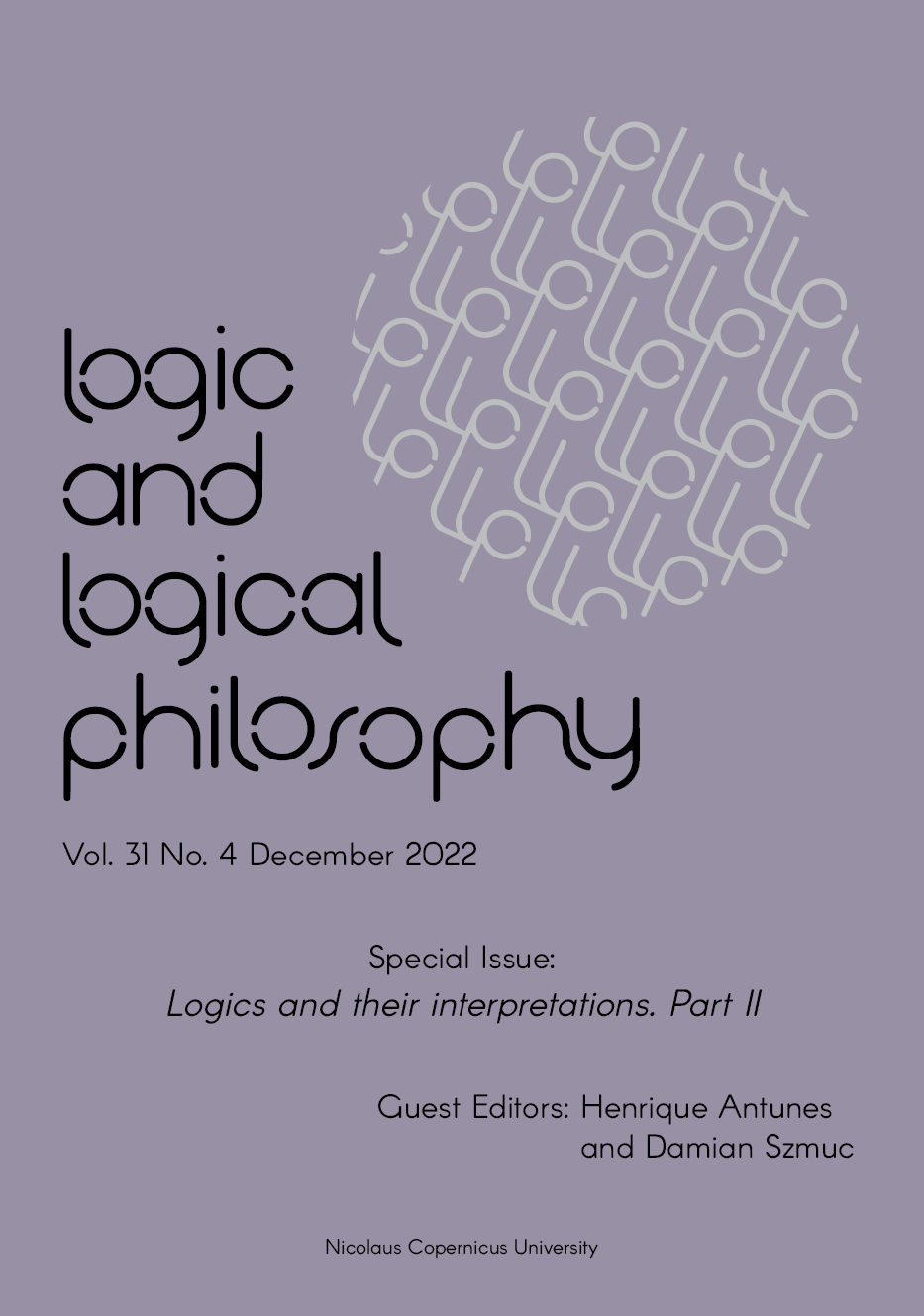Game Semantics, Quantifiers and Logical Omniscience
DOI:
https://doi.org/10.12775/LLP.2022.021Słowa kluczowe
game-theoretic semantics, logical omniscience, quantifiers, urn semantics, existential importAbstrakt
Logical omniscience states that the knowledge set of ordinary rational agents is closed for its logical consequences. Although epistemic logicians in general judge this principle unrealistic, there is no consensus on how it should be restrained. The challenge is conceptual: we must find adequate criteria for separating obvious logical consequences (consequences for which epistemic closure certainly holds) from non-obvious ones. Non-classical game-theoretic semantics has been employed in this discussion with relative success. On the one hand, with urn semantics [15], an expressive fragment of classical game semantics that weakens the dependence relations between quantifiers occurring in a formula, we can formalize, for a broad array of examples, epistemic scenarios in which an individual ignores the validity of some first-order sentence. On the other hand, urn semantics offers a disproportionate restriction of logical omniscience. Therefore, an improvement of this system is needed to obtain a better solution of the problem. In this paper, I argue that our linguistic competence in using quantifiers requires a sort of basic hypothetical logical knowledge that can be formulated as follows: when inquiring after the truth-value of ∀xφ, an individual might be unaware of all substitutional instances this sentence accepts, but at least she must know that, if an element a is given, then ∀xφ holds only if φ(x/a) is true. This thesis accepts game-theoretic formalization in terms of a refinement of urn semantics. I maintain that the system so obtained (US+) affords an improved solution of the logical omniscience problem. To do this, I characterize first-order theoremhood in US+. As a consequence of this result, we will see that the ideal reasoner depicted by US+ only knows the validity of first-order formulas whose Herbrand witnesses can be trivially found, a fact that provides strong evidence that our refinement of urn semantics captures a relevant sense of logical obviousness.
Bibliografia
Aristotle, R. Smith, Prior Analytics, Indianapolis: Hackett Publishing, 1989.
Boolos, G. S., J. P. Burgess and R. C. Jeffrey, Computability and Logic, Cambridge: Cambridge University Press, 2002. DOI: http://dx.doi.org/10.1017/CBO9781139164931
Brandom, R., Making it Explicit: Reasoning, Representing, and Discursive Commitment, Cambridge: Harvard University Press, 1998.
D’Agostino, M., “Tractable depth-bounded logics and the problem of logical omniscience”, pages 245–275 in H. Hosni and F. Montagna (eds.), Probability, Uncertainty and Rationality, Edizioni Scuola Normale Superiore (Springer).
Davidson, D., “Truth and meaning”, pages 93–111 in Philosophy, Language and Artificial Intelligence, Dordrecht: Springer, 1967.
French, R., “A sequent calculus for urn logic”, Journal of Logic, Language and Information, 24, 2 (2015): 131–147. DOI: http://dx.doi.org/10.1007/s10849-015-9216-5
Geurts, B., “Existential import”, pages 253–271 in Existence: Semantics and syntax, Dordrecht: Springer, 2008.
Halpern, J. Y., and R. Pucella, “Dealing with logical omniscience: Expressiveness and pragmatics”, Artificial Intelligence 175, 1 (2011): 220–235. DOI: http://dx.doi.org/10.1016/j.artint.2010.04.009
Hintikka, J., “Distributive normal forms in first-order logic”, pages 48–91 in Studies in Logic and the Foundations of Mathematics, Amsterdam: Elsevier, 1965.
Hodges, W., A Shorter Model Theory, Cambridge: CUP, 1997.
Jago, M., “Hintikka and Cresswell on logical omniscience”, Logic and Logical Philosophy, 15, 4 (2006): 325–354. DOI: http://dx.doi.org/10.12775/LLP.2006.019
Jago, M., “The content of deduction”, Journal of Philosophical Logic, 42, 2 (2013): 317–334. DOI: http://dx.doi.org/10.1007/s10992-011-9222-2
Mendonça, B. R, “Traditional theory of semantic information without scandal of deduction: A moderately externalist reassessment of the topic based on urn semantics and a paraconsistent application”, PhD Thesis, Campinas: Unicamp, 2018.
Marion, M., and H. Rückert, “Aristotle on universal quantification: a study from the point of view of game semantics”, History and Philosophy of Logic, 37, 3 (2016): 201–229. DOI: http://dx.doi.org/10.1080/01445340.2015.1089043
Rantala, V., “Urn models: a new kind of non-standard model for first-order logic”, pages 347–366 in E. Saarinen (ed.) Game-Theoretical Semantics, Dordrecht: Springer, 1978. DOI: http://dx.doi.org/10.1007/978-1-4020-4108-2_12
Reiter, R., “A logic for default reasoning”, Artificial Intelligence, 13, 1–2 (1980): 81–137. DOI: http://dx.doi.org/10.1016/0004-3702(80)90014-4
Sequoiah-Grayson, S., “The scandal of deduction”, Journal of Philosophical Logic, 37, 1 (2008): 67–94. DOI: http://dx.doi.org/10.1007/s10992-007-9060-4
Shoenfield, J. R., Mathematical Logic, Massachusetts: ASL, 1967.
Tulenheimo, T., “Independence friendly logic”, in E. N. Zalta (ed.), The Stanford Encyclopedia of Philosophy, Metaphysics Research Lab, Stanford University, 2018. https://stanford.library.sydney.edu.au/archives/sum2010/entries/logic-if/
Väanänen, J., Models and Games, Cambridge: CUP, 2011. DOI: http://dx.doi.org/10.1017/CBO9780511974885
Pobrania
Opublikowane
Jak cytować
Numer
Dział
Licencja
Prawa autorskie (c) 2022 Bruno Ramos Mendonça

Utwór dostępny jest na licencji Creative Commons Uznanie autorstwa – Bez utworów zależnych 4.0 Międzynarodowe.
Statystyki
Liczba wyświetleń i pobrań: 1452
Liczba cytowań: 0







